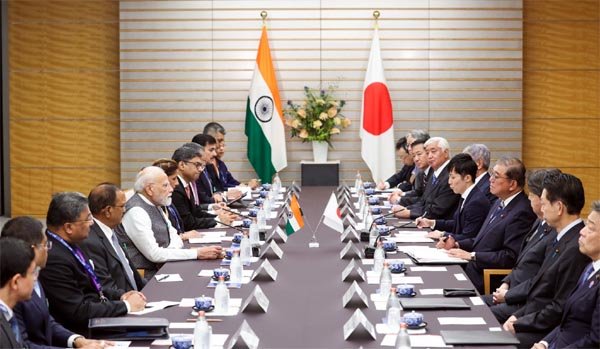New Delhi, Aug 29 (UNI) Amid PM Modi’s visit to Japan, during which he addressed the India-Japan Economic Forum today and urged for more bilateral business cooperation, here is a look at the investments and cooperation ventures between India and Japan.
In the field of Investment, Japan’s investments in India continue to accelerate. Over 170 MoUs were signed in two years which represent more than USD 13 billion in committed investments.
These include: (i) Nippon Steel (AM/NS India): INR 15 billion expansion in Gujarat; INR 56 billion integrated steel plant in Andhra Pradesh.
(ii) Suzuki Motor: INR 350 billion for a new Gujarat plant; INR 32 billion to expand production lines.
(iii) Toyota Kirloskar: INR 33 billion expansion in Karnataka; INR 200 billion new plant in Maharashtra.
(iv) Sumitomo Realty: USD 4.76 billion in real estate.
(v) JFE Steel: INR 445 billion to strengthen electrical steel production.
(vi) Osaka Gas: 400 MW renewables, with future green hydrogen initiatives.
(vii) Astroscale: First Japanese commercial satellite launches using ISRO’s PSLV. This spread of investment across steel, automotive, renewables, semiconductors, real estate, and aerospace cements Japan’s confidence in India’s long-term economic potential.
There are enormous benefits for Indian SMEs: Japanese industry partnerships are pulling Indian SMEs into global supply chains.
(i) Tokyo Electron & Fujifilm with Tata Electronics: Building a semiconductor ecosystem, with Indian SMEs becoming suppliers for high-value components.
(ii) Toyota & Suzuki: Their value chains will integrate hundreds of Tier-2/3 Indian SMEs.
(iii) Fujitsu: Recruiting 9,000 Indian engineers in its Global Capability Center, boosting IT-linked SMEs. SMEs will gain global-standard practices, technology infusion, and market access, elevating India’s export competitiveness.
The Japanese investment benefits Indian Farmers and promotes Sustainable Development Japanese cooperation is directly empowering India’s rural economy through green energy projects.
(i) Sojitz Corporation, in partnership with Indian Oil, is investing USD 395 million to establish 30 biogas plants that will produce 1.6 million tons annually. Farmers will supply crop residues and agri-waste, earning additional income while supporting India’s clean energy transition.
(ii) Suzuki Motor Corporation, working with the National Dairy Development Board and local dairy cooperatives, is launching a biogas initiative adopted by UNIDO under its Industrial Cooperation Programme in the Global South (funded by Japan’s METI). Four biogas production plants in Banaskantha district in Gujarat made with the total investment of INR 2.3 billion (approximately JPY 4 billion) are aimed to convert cow dung into carbon-neutral biogas for CNG vehicles, which make up 20% of India’s passenger car market. This will help cut emissions, strengthen energy self-sufficiency, create rural jobs, and raise farmer incomes, while embedding Japanese technology into scalable clean-energy infrastructure.
Exports and Manufacturing with Japanese JV & Knowhow
Japanese JVs in India unlock export growth. (i) Nippon Steel’s projects will boost specialty steel exports to auto & energy markets.
(ii) Toyota & Suzuki: Hybrid/EV vehicles made in India are to be exported to Africa, the Middle East, and SE Asia.
(iii) Fujifilm & Tata: Strengthening India’s position in global chip supply chains. (iv) Osaka Gas renewables:
Adding India to global clean energy value flows. This ensures “Make in India with Japan, Export to the World.” Human Resources & Knowledge Exchange: This area is rapidly expanding under the India–Japan Talent Bridge program and METI initiatives.
(i) Talent Exchange Target: 500,000 Indians and Japanese exchanges in 5 years via study abroad, internships, and employment.
(ii) Sectoral Focus: Semiconductors, AI, IT, robotics, clean energy.
(iii) Programs:
(a) Career events at 8 leading Indian universities (IIT Guwahati, IIT Kharagpur, IIT Kanpur, IIT Gandhinagar, BITS Pilani, University of Delhi, IISc Bangalore, Anna University).
(b) Internships in India, Japan, and online, lowering barriers for students.
(c) Japan tours: Professors and students invited for company visits, university roundtables, and networking with Japanese firms.
(d) Professional career events (TechSparks, NASSCOM, online job fairs) for mid-career Indian professionals.
(e) Talent Market Reports to help Japanese firms better understand Indian labor dynamics.
(iv) Japanese Companies Involved:
(a) Nidec: Building a global software development center in Bengaluru; hiring Indian engineers for motors, appliances, and EVs.
(b) Musashi Seimitsu: Developing e-Axles for two-wheeler EVs with India–Africa focus, hiring Indian graduates for R&D.
(c) Dai-ichi Life Techno Cross: Recruiting bilingual Indian IT engineers.
(d) Money Forward India: Expanding financial tech platforms with Indian engineers.
(e) Beyond Next Ventures: Funding Indian deep-tech start-ups, offering research internships.
(v) METI Initiatives:
(a) Budget of JPY 15 billion for skill and HR cooperation.
(b) Five key programs: 1. Japanese company missions to India for partnerships. 2. Job fairs for Indian youth. 3. Subsidies for Japanese firms hosting Indian IT/technical interns. 4. Japanese-language training for Indians headed to Japan. 5. Sending Japanese instructors to India for manufacturing skill transfer. This dual approach — academic & corporate — will solve Japan’s labor shortages while giving Indian youth global exposure and high-skill pathways.
Assam–ASEAN Holdings MoU
A notable MoU was signed between the Government of Assam and M/s ASEAN Holdings, highlighting Japan’s commitment to India’s northeast. • Focus: investment in industrial infrastructure, logistics, and agro-based industries. • This also dovetails with Japan’s long-standing interest in Act East Policy and development of India’s northeast.
7. Make in India, Make for the World – Global Outlook The vision now extends beyond bilateral ties: • At the Japan–India–Africa Forum and recently held 9th TICAD Summit in Tokyo, India emerged as an anchor country for connectivity and industrial corridors. •
Priorities: Mineral security (rare earths, lithium, cobalt).
Supply chain resilience in semiconductors and EVs.
Export markets in Africa and Middle East for Made-in-India goods with Japanese technology. This ensures that “Make in India, Make for the World” is realized, with India–Japan partnership shaping not just economies but also regional security and resilience.
From steel plants in Gujarat to biogas projects in rural India, From Assam’s gateway role to Tokyo’s advanced R&D labs, from farmers in rural India to AI engineers in Bangalore and Tokyo, from semiconductor fabs to academic exchanges, the India–Japan MoUs are building the bridge to a new era of cooperation.
With “Make in India, Make for the World” as the guiding vision, this partnership is set to reshape industrial, agricultural, and human capital landscapes, not only for the two nations but for the whole Region and the World at large.
Together, the two nations are investing not only in industries and supply chains, but in people, knowledge, and shared futures.
India-Japan: Over 170 MoUs signed in two years, representing USD 13 bn in committed investments











